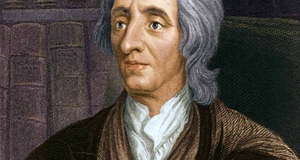Hobbes' Leviathan and Views on the Origins of Civil Government: Conservatism by Covenant
By
2010, Vol. 2 No. 12 | pg. 2/2 | « To understand Hobbes’ ideas of the commonwealth’s creation, we must also examine his description of the form it should take. Because he believes that mankind is so fundamentally flawed, and because he is so frightened of the state of nature, Hobbes decides that a sovereign with unconstrained power should rule the commonwealth indefinitely. Hobbes argues that the sovereign should have unlimited rights, with no dissent or dissolution. He says that whichever way the sovereign comes to power, his rights are the same: “His power cannot, without his consent, be transferred to another; he cannot forfeit it; he cannot be accused by any of his subjects of injury; he cannot be punished by them; he is judge of what is necessary for peace, and judge of doctrines,” et cetera (128 20 3). There is no judge above him or power to punish him and so he is above the law (29 9 213). He says that because the sovereign acts in place of his subjects, his actions are technically theirs, and that because no person can injure himself the sovereign can therefore do no harm to his subjects (18 6 113). Hobbes says that because the sovereign’s goals are peace and defence for his people, “whosever has right to the end has right to the means” (18 8 113).He then dismisses dissent and dissolution, saying that dissenters, having submitted to the covenant, must “consent with the rest,” and that the subjects as a whole “cannot without [the Sovereign’s] leave cast off monarchy and return to the confusion of a disunited multitude (18 5 112; 18 2-3 110). To those who would argue that subjects are generally unhappy under powerful rulers, Hobbes responds that men will never be entirely happy and that a civil war would create an incredible amount of misery (18 20 118). Essentially, Hobbes believes that once the commonwealth is formed, the contract is binding. Hobbes also addresses which regime type the sovereign should take, deciding that a monarch is superior because it most directly concentrates power without constraints. He lists three kinds of commonwealths, each defined by the difference of the sovereign, but decides that a monarchy is far superior. Aristocracies, in which a part of the population rules, and democracies, in which a representative assembly governs, are weaker than a monarchy, according to Hobbes, because they are less able to produce peace and security (19 4 120). Monarchs, he says, are subject only to the inconsistency of one person’s human nature, while assemblies have inconsistencies of number as well (19 6 120). Assembly members can disagree with one another, and start a civil war, Locke says, and the benefits of favoritism of a monarch are few while the favorites of assemblies are many (19 8 121). Due to these perceived benefits, Hobbes believes that the covenant-created commonwealth should take the form of a monarchy. While Hobbes provides detailed arguments for most of these ideas, some of his arguments are flawed. The first problem is that his theoretical explanation of the formation of government does not allow for practical application. Hobbes claims that all governments are created through a covenant, but it is certain that governments are often imposed on unwilling subjects. Hobbes seems to justify this by asserting that all men acting rationally would want to consent to the commonwealth, because the alternative (the state of nature) is so unappealing, but without any means for men to actually choose to give their consent, this is unknowable at best. Of course, even if a sovereign was chosen by the people, his successors would not come to power under the same circumstances, and the subjects’ descendants would not have been given a choice. Hobbes states that there is no difference between the rights of a sovereign who comes to power by force and a sovereign who is elected to power through political means; he even responds to potential critics who “hold all such covenants as proceed from fear of death or violence void,” saying that “if it were true, no man in any kind of commonwealth could be obliged to obedience” (20 2 127). Given the demands Hobbes makes of citizens because they have (supposedly) voluntarily consented to the covenant, it seems incredibly unfair that most subjects are not actually able to choose whether or not they would want to consent. The second criticism of Hobbes’ arguments is that he relies heavily upon a benevolent sovereign who is able to put aside his own interests to work for the benefit of his citizens (an unlikely possibility). In fact, one of the most eloquent critiques of Hobbes’ argument for unlimited monarchical power comes from the author himself, when he writes, “Whosoever beareth the person of the people... beareth also his own natural person." And though he is careful in his politic person to procure the common interest, yet he is more (or no less) careful to procure the private good of himself, his family, kindred and friends, and for the most part if the public interest chance to cross the private, he prefers the private; for the passions of men are commonly more potent than their reason” (19 4 120). Hobbes’ counter argument is that under a monarchy, the private and public interest are the same, because a monarch’s riches, power and honor come from that of his subjects, but oftentimes this simply is not true (19 4 120). History has consistently shown that absolute power corrupts absolutely, that when leaders are allowed to act however they wish they more often than take what they want at the expense of the state and their citizens. Hobbes’ reliance on a monarch who would somehow be able to ignore his personal desires for the good of the country makes his political regime seem much less practical. The last problem with Hobbes’ arguments is that they contain contradictory statements, specifically regarding the ability to make covenants with a multitude of people. When he writes of the covenant in which the commonwealth is formed, Hobbes writes, “it is a real unity of them all . . . made by covenant of every man with every man, in such manner as if every man should say to every man I authorize and give up my right of governing myself to this man . . . ” (17 13 109). Hobbes says that each man has made a covenant with every other man in the commonwealth. Yet later, when Hobbes discusses the rights of the sovereign, he says that the Sovereign made no covenant with his subjects because there are too many of them for him to have made a covenant with (18 4 111). He says, “with the whole, as one party, it is impossible, because as yet they are not one person” (18 4 111). Far from a technical distinction, this idea is used to justify a sovereign’s unquestioned ability to act as he pleases and the inability of his subjects to rebel; Hobbes says that because the sovereign did not make a covenant with the people, “there can happen no breach of covenant on the part of the sovereign, and consequently none of his subjects, by any pretence of forfeiture, can be freed from his subjection” (18 4 111). These contradictions discredit Hobbes’ arguments and lead to questionable conclusions. Working off of his ideas of human nature and the state and laws of nature, Hobbes theorizes that governments are formed through covenants of the citizens, who choose to cede their rights to one leader or group of leaders who assumes their authority and makes decisions on their behalf. Because humans are so quarrelsome and the state of nature is so intolerable, Hobbes feels that a powerful monarch can best keep law and order in society. Most of what Hobbes says is logical, if not universally accepted, but he does not address sufficiently how governments are formed in real-life situations. His ideas of a monarch do not take into account human weakness, and some of his statements are conflictual. Ultimately, his ideas are interesting and valid, but not all of the arguments supporting them survive a critical examination. ReferencesThomas Hobbes. Leviathan. Ed. Edwin Curley. Indianapolis: Hackett Publishing Company, 1994. Suggested Reading from Inquiries Journal
Inquiries Journal provides undergraduate and graduate students around the world a platform for the wide dissemination of academic work over a range of core disciplines. Representing the work of students from hundreds of institutions around the globe, Inquiries Journal's large database of academic articles is completely free. Learn more | Blog | Submit Latest in Political Science |


















